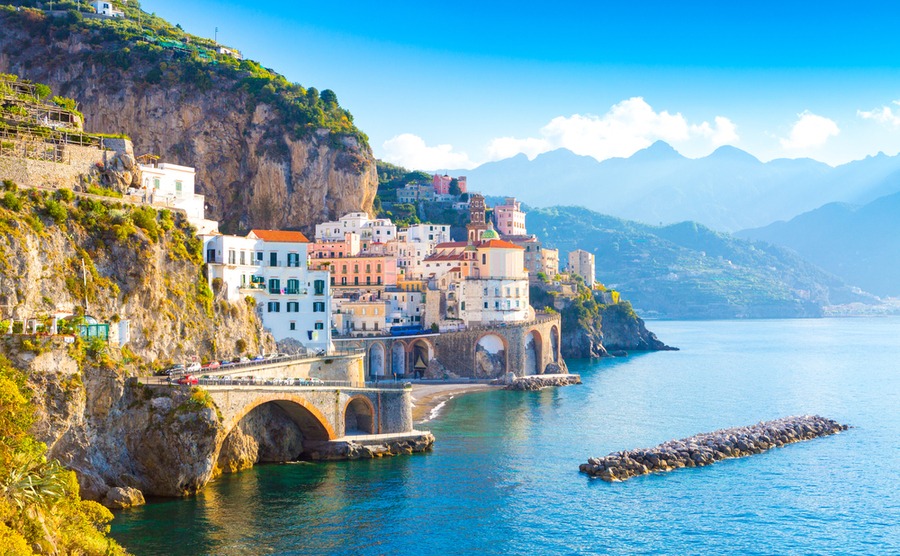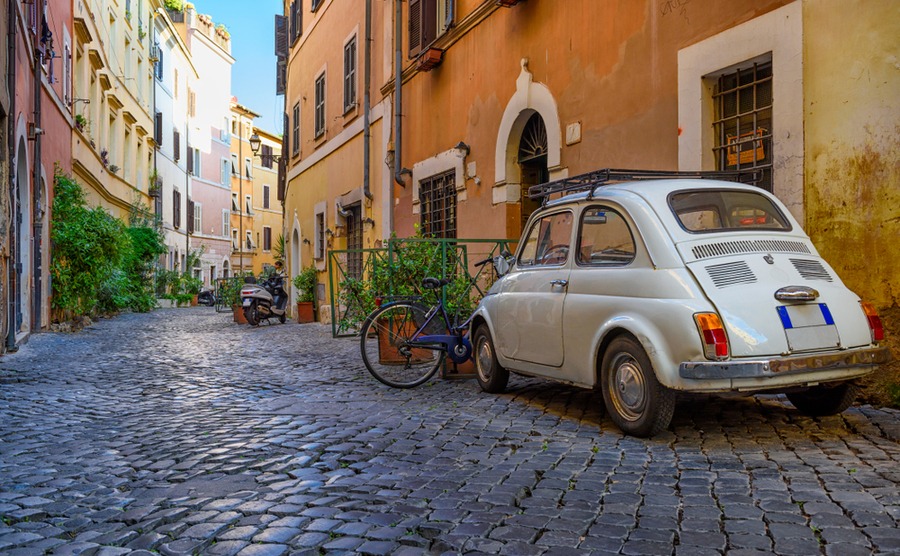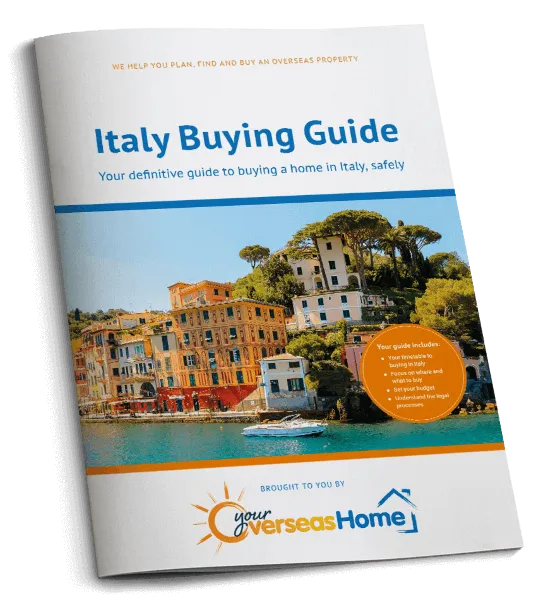For the self-employed (or those considering becoming self-employed), Italy offers a wonderful quality of life. There are, of course, logistics to get your head around, but once you do, a life of sunshine, great food and brilliant beaches await you.
So, how do you become self-employed in Italy? Let’s take a look…
FIND your dream Italian property here.
Get the appropriate visa
If you want to work in Italy as a freelancer or carry out other self-employed work, the chances are you will need a self-employment visa and work permit. You can find basic information on what is required for this type of visa by doing a quick questionnaire on the Italian Foreign Affairs website, referred to as Farnesina.

Even small towns are starting to install high speed internet
Be aware that there is a fixed annual quota by means of a Decree called the “decreto-flussi“. This limits the number of foreign nationals allowed to apply to be self-employed in Italy and sets a time period for applications. Allow plenty of time as it can take up to 120 days for the visa to be issued. It’s valid for up to 2 years, but you can extend it. With this type of visa, your family can also join you and if you meet the criteria, it can lead to permanent residency.
To apply for a self-employment visa you will first need to obtain a self-employment work permit. This is an authorisation to work called a “nulla osta”. You apply for this with the “Sportello Unico per l’Immigrazione” of the Prefecture of the territory where you will be domiciled or where the place of work takes place. Applications for the visa on the basis of self employment should be applied for at the Italian Consulate in your current home country, while you are still living there. You will be required to attend a face-to-face interview and to provide the documents to support your application.
Before you fly over to Italy to view properties, make sure to get your free Italian Viewing Trip Guide. It explains how to avoid the common pitfalls and what questions to ask your estate agent.
Find a ‘smart’ Italian town or city
There are a growing number of Italians now choosing to work from home, and freelance working (liberi professionisti) is also growing in popularity. This is largely because it is getting much easier. Even very small towns are now starting to install high speed internet to tempt people out of the cities and attract new residents.
There are also numerous ‘smart’ cities which are those that keep up to speed with new technology and the development of its infrastructure. They also promote sustainable development and aim for energy self-sufficiency. Ultimately, they care about the quality of life and needs of their citizens.
Start your Italian property search today.
Milan is the obvious example of a smart city, however, other Italian cities such as Trento, Turin, Bologna, Bolzano, Bergamo, Brescia, Ferrara, Parma and Modena also have a lot to offer. For example, Trento is a highly-rated smart city and is one of the country’s wealthiest and most prosperous cities.
Over 25% of the Italian working population are now freelance which is well above the European average. Any self employed person without employees can be referred to as freelance. These could include artists, writers, translators, English tutors, and accountants. Could you join them?
Don’t spend any money on your move abroad until you’ve read The Currency Guide to Emigration, free to download.
Stay connected and make contacts
If your line of work requires a big city location with good internet connection, a great place to start is at one of the “co-working” spaces in cities such as Milan. Here you can rent a desk, hire an office or meeting room, and make some great contacts. You’ll also get to hear about upcoming networking events.
Thanks to the rise of freelance working in Italy, you will also find many bars and cafes with good wifi (and great coffee!). It’s amazing how many contacts you can make over an espresso in an Italian bar.

It’s amazing how many great contacts you can make over an expresso in an Italian bar.
It can also be a good idea to search out local expat groups on social media to make contacts and to advertise your service or product. Recommendations and introductions from other local expats can be invaluable when it comes to finding a local accountant and other important contacts.
If your choice of work can be done in any location, consider relocating to one of Italy’s under populated villages. Housing costs will be far cheaper and some even offer incentives/payment to people wanting to take up residence and work. The village of Candela in Puglia and Santo Stefano di Sessanio in Abruzzo have been doing this.
The region of Calabria also has several villages that are planning to offer money incentives to attract people under forty to start up small businesses and live there.
Understand what you can and can’t do in Italy during your visa-less 90 days
For UK citizens, you can only stay in Italy for 90 days in any 180 day period without a visa. There is free movement for citizens of the EU to visit Italy for longer periods.
While strictly speaking you shouldn’t work in Italy during your 90-day visit, the Schengen visa waiver does allow you to make fact-finding visits, attend trade fairs, meet contractors or sellers, attend meetings and consultations, and negotiate deals.
How to legally become self employed in Italy
A permanent resident in Italy can become self employed (lavoro autonomo or lavoro in proprio), work freelance (lavoro indipendente or libero professionista) or become a sole trader (commerciante in proprio, imprenditore or ditta individuale).
It can take some time to fill out all the documents properly, so I’d recommend getting some help with this. Although, some forms are beginning to become available online, it can be easier to have the documents in front of you. Get a professional advisor and Italian speaker to assist you with filling them in. In Italy it is often better to deal with people face-to-face and visit offices in person whenever possible. To be put in touch with our recommended and trusted lawyer, just click here.
We can put you in touch with a trusted lawyer for advice about becoming self employed in Italy
Tax advice
You should always get professional advice on paying tax in Italy.
Tax advisors or business consultants (commercialista) may also be found through the British Chamber of Commerce for Italy. Once you have your tax number you should also register with the Italian chamber of commerce of the Italian town you are resident in.
You could also seek recommendations for a commercialista from other expats in the area you are going to live. Hopefully, they will speak English and have experience of cross-border tax regulations, as well as essential local knowledge.

You can get assistance and advice about tax issues at one of the 1000 Italian tax assistance centres (Centro Assistenza Fiscale – CAF) across the country.
Tax code
To become a resident freelancer (libero professionista), you’ll need to be issued with an Italian tax number (Partita IVA) which will allow you to make invoices and receive payments. When resident in Italy you must pay tax on your income in Italy.
Social security
By law, all businesses must enroll with INPS (National Institute of Social Security) which is the main social security institution of the Italian public pensions and benefits system. There are local INPS offices, that you can visit.
Make sure you get the best possible mortgage for your property by talking to your recommended Italian mortgage specialist.
Documents needed to become self employed
Italian authorities may request various documents at different stages of getting set up as a self employed worker in Italy. Many will also be needed for your visa application and to register as a resident.
It’s worth keeping several photocopies as back up and taking everything with you to consultations. Any documents issued outside of Italy must be legalised (apostilled). They could also ask for them to be translated into Italian, with the translation legalised by the Italian consulate.
You may be asked to show: your passport; proof you have enough money to support yourself and your family; proof of accommodation in Italy; proof that your proposed salary meets minimum requirements and that your income from the previous year met minimum requirements; a Chamber of Commerce certificate; a certificate from an Italian association for your profession, confirming you have the necessary licences and approval to start your business.
Proof of accommodation
Proof of accommodation for the visa may take the form of a contract for the purchase or lease of a property, confirmation letter of a hotel reservation of at least 30 days, or a declaration made by an Italian or foreign citizen legally residing in Italy, stating that they have made available suitable accommodation.
Where to apply for a visa in the UK
You can apply for a visa directly at the Consulate general of Italy in London, Manchester or Edinburgh. An easier option is to use the services of VFS Global, who are official partners of the Italian Embassy in the UK.
Lastly, why work in Italy?
Italy is one of the top three economies in the eurozone and the second largest manufacturing economy. There is an increasing demand for “Made in Italy” products, which are viewed as being prestigious and high quality. Logistically, Italy is in a great location for providing goods and services to consumers across Europe, North Africa and the Middle East.

Logistically, Italy is in a great location for providing goods and services to consumers across Europe, North Africa and the Middle East.
Italy also has a reputation for offering a wonderful lifestyle surrounded by history, culture, great cuisine, art and design. Tourist related businesses have the potential to flourish, as tourist arrivals have increased each year, reaching 131.4 million arrivals in 2019 (Source: Statista).
Italy is also the biggest beneficiary of the EU Covid-19 recovery fund. Already €24.9 billion have been transferred to Italy this summer which will help the country invest further in areas such as greener and more sustainable mobility systems, renewable energy, the digitalisation of businesses, the roll-out of 5G and ultra-broadband, and a more attractive and competitive business environment.
European Commissioner for the Economy and former Italian prime minister Paolo Gentiloni has said, ”Italy’s plan will modernise the country and create new opportunities….It is a once-in-a-lifetime chance for Italy to relaunch the economy and build a sustainable future for the next generations”.











